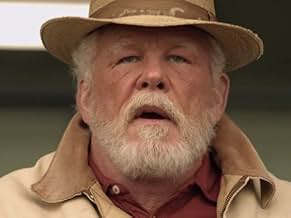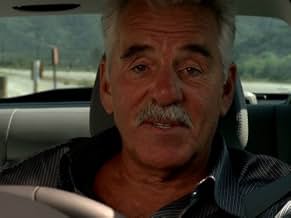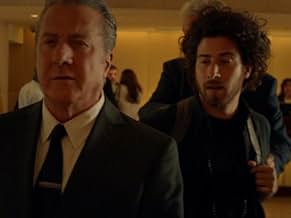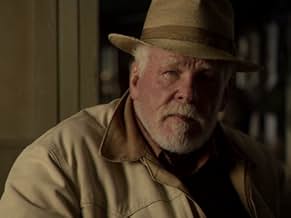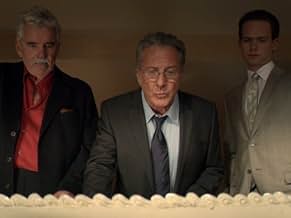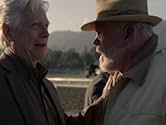Una mirada provocativa al mundo del juego y las carreras de caballos contada a través de un grupo de personajes diversos alrededor de un hipódromo californiano.Una mirada provocativa al mundo del juego y las carreras de caballos contada a través de un grupo de personajes diversos alrededor de un hipódromo californiano.Una mirada provocativa al mundo del juego y las carreras de caballos contada a través de un grupo de personajes diversos alrededor de un hipódromo californiano.
- Premios
- 2 premios ganados y 10 nominaciones en total
Explorar episodios
Opiniones destacadas
This was cancelled early, it's unfinished work, so that even after 9 hours of narrative time it feels like only the first few pages have been turned; but were we any better for having seen six seasons of The Sopranos rather than two, did it enrich that much more?
I came to it for Mann, one of the preeminent makers of the alert eye in our time, the finished thing turned out to be in the template of The Sopranos and Deadwood where the actors and word are the vessels for drama. It is complex plotwise and immersive enough because colorful characters articulately snarl at each other; but complex expression is not deep intuition, immersion is not concentration.
So it might seem like complex work if you get caught up in the schemes for money and ownership and here is where the lack of resolution will disappoint, it ends just as the stage has been set for conflict. But if you don't get tangled up in them, you can discern all that matters.
The racetrack as the stage of drama with desperate souls caught viewing by the sidelines at what they have chosen to have a stake in. The Jewish mobster who wants to buy off the racetrack will win against his rival but at what cost to his soul? Loved ones will perish, it could be a grandson or a horse, so that we finally awaken at what had been valuable all this time.
It's all in the horses and what they exemplify, magnificent creatures that everyone should spend some time with. Characters of course ignore the horses as anything more than ticket slips that buy them a seat in that arena of spectacle where their presence can be rewarded with the anxiety of winning or losing. To what purpose? So they can carry the drama with them in unfulfilled lives until another scheme the next day.
So this is the insight to leave this with, it's in Mann's pilot and the last episode. The horses race marvelously simply for having the exhilarating capacity to do it, there is no "horse race" for them and only running, doing without ego. The viewers watch from the sides transfixed. Would any of this have meaning for them had they not hedged a bet that imbues the beauty with the anxiety and drama of winning or losing? Would they be at all there? Would you?
So if you're disappointed that we don't get to find out how any of the schemes pans out (Turo's race fixing, the old man's legal trouble), you become like they are, bogged down in meaningless schemes. Meanwhile what has the capacity to enrich had been right under your nose all this time, simply being there to take care of something for its capacity to be what it is; the woman who arranges the horse caring program for inmates inserts this notion in the small portion we have.
But with the caveat that it will not always be there for you to postpone it. A horse might have to be put down. A show might be cancelled.
I came to it for Mann, one of the preeminent makers of the alert eye in our time, the finished thing turned out to be in the template of The Sopranos and Deadwood where the actors and word are the vessels for drama. It is complex plotwise and immersive enough because colorful characters articulately snarl at each other; but complex expression is not deep intuition, immersion is not concentration.
So it might seem like complex work if you get caught up in the schemes for money and ownership and here is where the lack of resolution will disappoint, it ends just as the stage has been set for conflict. But if you don't get tangled up in them, you can discern all that matters.
The racetrack as the stage of drama with desperate souls caught viewing by the sidelines at what they have chosen to have a stake in. The Jewish mobster who wants to buy off the racetrack will win against his rival but at what cost to his soul? Loved ones will perish, it could be a grandson or a horse, so that we finally awaken at what had been valuable all this time.
It's all in the horses and what they exemplify, magnificent creatures that everyone should spend some time with. Characters of course ignore the horses as anything more than ticket slips that buy them a seat in that arena of spectacle where their presence can be rewarded with the anxiety of winning or losing. To what purpose? So they can carry the drama with them in unfulfilled lives until another scheme the next day.
So this is the insight to leave this with, it's in Mann's pilot and the last episode. The horses race marvelously simply for having the exhilarating capacity to do it, there is no "horse race" for them and only running, doing without ego. The viewers watch from the sides transfixed. Would any of this have meaning for them had they not hedged a bet that imbues the beauty with the anxiety and drama of winning or losing? Would they be at all there? Would you?
So if you're disappointed that we don't get to find out how any of the schemes pans out (Turo's race fixing, the old man's legal trouble), you become like they are, bogged down in meaningless schemes. Meanwhile what has the capacity to enrich had been right under your nose all this time, simply being there to take care of something for its capacity to be what it is; the woman who arranges the horse caring program for inmates inserts this notion in the small portion we have.
But with the caveat that it will not always be there for you to postpone it. A horse might have to be put down. A show might be cancelled.
To appreciate this show you must study it. It's obtuse. You need to ask questions and answer them with guesses until you finally get confirmation (if you ever do). It's an investment.
Is it worth the trouble? I watched (and re-watched some) episodes to to be sure I wasn't missing the subtext of LUCK. The Nick Nolte character turns out way too enigmatic to care about. The juicy "Rosie" character turns out frustratingly lovable. Frustrating because you learn to love her while the plot pushes her outward from the center of the plot.
Dustin Hoffman does his best work posing still for intensely brilliant camera shots. He doesn't act much. That surprised me. You feel the director is building up tension for a wild explosion that will eventually occur. I'll admit, it's fascinating, but vexing at the same time.
Now that we know the series is canceled, there is no hope the suspense will be relieved and resolved. The characters will remain obscure. One exception is Marcus, played by Kevin Dunn. This disabled gambler is a reincarnation of Andy Sipowicz (the acerbic cop from NYPD Blue) with all the vinegar and cynical wit, but a genuine human heart. This is the one character we will not forget (those of us who studied this ill-fated series).
Sorry this bold artsy gamble didn't pay off. It was a deal gone bad.
Is it worth the trouble? I watched (and re-watched some) episodes to to be sure I wasn't missing the subtext of LUCK. The Nick Nolte character turns out way too enigmatic to care about. The juicy "Rosie" character turns out frustratingly lovable. Frustrating because you learn to love her while the plot pushes her outward from the center of the plot.
Dustin Hoffman does his best work posing still for intensely brilliant camera shots. He doesn't act much. That surprised me. You feel the director is building up tension for a wild explosion that will eventually occur. I'll admit, it's fascinating, but vexing at the same time.
Now that we know the series is canceled, there is no hope the suspense will be relieved and resolved. The characters will remain obscure. One exception is Marcus, played by Kevin Dunn. This disabled gambler is a reincarnation of Andy Sipowicz (the acerbic cop from NYPD Blue) with all the vinegar and cynical wit, but a genuine human heart. This is the one character we will not forget (those of us who studied this ill-fated series).
Sorry this bold artsy gamble didn't pay off. It was a deal gone bad.
Luck was an epic show. In only 9 episodes, it weaved together numerous, insanely complex story lines which many people probably had trouble following. But what started as a 'too dense for anything but pretense' project soon turned into an amazingly broad show whose characters included mafia, rounders, trainers, jockeys, agents, horse owners, and many others - to create an incredibly smart show which, in my opinion, sought to expose the world of horse racing to the many who are uninformed, or simply would not normally care. The characters and writing were top notch, and this definitely should have been allowed more time to flesh out.
Hopefully another network won't be as scared of PETA and will pick it up.
Hopefully another network won't be as scared of PETA and will pick it up.
Minor? actor Richard Kind (as Joey Rathburn) in shorter scenes with just a few stuttering lines hits massive grand slams, basically stealing the entire series from giants Hoffman and Nolte.
Everybody is excellent but Kind wins the 'race' by 20 to 30 links.
As someone who has grown up on a Kentucky horse farm and who has been to racetracks all over the world, it was very gratifying to hear that someone with as much talent as David Milch was going to take on the genre in a T V series. It doesn't hurt that he has experienced some of the highest highs and lowest lows that racing can offer since he has owned a racing stable for over 20 years. Everyone in the thoroughbred racing and breeding world knew that the stories are out there just waiting to be told. Just look at how successful Dick Francis was with his string of best selling racing related mysteries. The problem has always been, how do the stories get told without being terribly corny, like "Secretariat"? The temptation has always been to "dumb down" the dialogue to appeal to a broader group of non racing savvy viewers. Milch has taken a big chance by just going straight ahead without trying to pander to his audience. In the end, there is a chance that people will be turned off by the backstretch patois that only aficionados can translate. I hope that the intensity of the story line and beauty of the settings will draw viewers in as Milch has so successfully done with shows like "Deadwood" and "NYPD Blue". It's especially gratifying to see Hall of Fame jockey Gary Stevens and upcoming Canadian jockey Chantal Sutherland get a chance to showcase their acting abilities and if I know Milch's style, Stevens will end up with a very intriguing role, at least based on his character in the first two episodes. LUCK has been picked up for a second season as of today 1/31/12) which can only serve to give the show the chance to succeed that it so richly deserves.
¿Sabías que…?
- TriviaTwo horses were injured during filming and later euthanized. The American Humane Association (A.H.A.) released a statement saying that both racehorses suffered severe fractures that were checked by veterinarians and deemed inoperable. The People for the Ethical Treatment of Animals (P.E.T.A.) criticized HBO over the injuries and euthanization of the horses. After the death of a third horse, HBO suspended any filming involving horses while investigations by the A.H.A. took place. It was determined that the third horse was not injured during filming. HBO decided to cancel the series rather than risk any further animal injuries.
Selecciones populares
Inicia sesión para calificar y agrega a la lista de videos para obtener recomendaciones personalizadas
- How many seasons does Luck have?Con tecnología de Alexa
Detalles
- Tiempo de ejecución52 minutos
- Color
- Mezcla de sonido
- Relación de aspecto
- 1.78 : 1
Contribuir a esta página
Sugiere una edición o agrega el contenido que falta










